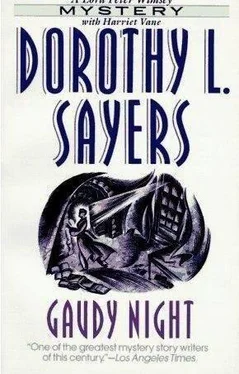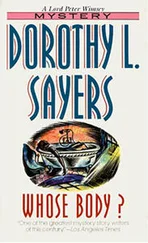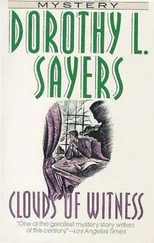Dorothy Sayers - Gaudy Night
Здесь есть возможность читать онлайн «Dorothy Sayers - Gaudy Night» весь текст электронной книги совершенно бесплатно (целиком полную версию без сокращений). В некоторых случаях можно слушать аудио, скачать через торрент в формате fb2 и присутствует краткое содержание. Жанр: Детектив, на английском языке. Описание произведения, (предисловие) а так же отзывы посетителей доступны на портале библиотеки ЛибКат.
- Название:Gaudy Night
- Автор:
- Жанр:
- Год:неизвестен
- ISBN:нет данных
- Рейтинг книги:4 / 5. Голосов: 2
-
Избранное:Добавить в избранное
- Отзывы:
-
Ваша оценка:
- 80
- 1
- 2
- 3
- 4
- 5
Gaudy Night: краткое содержание, описание и аннотация
Предлагаем к чтению аннотацию, описание, краткое содержание или предисловие (зависит от того, что написал сам автор книги «Gaudy Night»). Если вы не нашли необходимую информацию о книге — напишите в комментариях, мы постараемся отыскать её.
Gaudy Night — читать онлайн бесплатно полную книгу (весь текст) целиком
Ниже представлен текст книги, разбитый по страницам. Система сохранения места последней прочитанной страницы, позволяет с удобством читать онлайн бесплатно книгу «Gaudy Night», без необходимости каждый раз заново искать на чём Вы остановились. Поставьте закладку, и сможете в любой момент перейти на страницу, на которой закончили чтение.
Интервал:
Закладка:
“I’m always getting mixed up myself,” admitted Harriet. “I’ve never yet succeeded in producing a plot without at least six major howlers. Fortunately, nine readers out of ten get mixed up too, so it doesn’t matter. The tenth writes me a letter, and I promise to make the correction in the second edition, but I never do. After all, my books are only meant for fun; it’s not like a work of scholarship.”
“You always had a scholarly mind, though,” said Miss Lydgate, “and I expect you find your training a help in some ways, don’t you? I used to think you might take up an academic career.”
“Are you disappointed that I didn’t?”
“No, indeed. I think it’s so nice that our students go out and do such varied and interesting things, provided they do them well. And I must say, most of our students do exceedingly good work along their own lines.”
“What are the present lot like?”
“Well,” said Miss Lydgate, “we’ve got some very good people up, and they work surprisingly hard, when you think of all the outside activities they manage to carry on at the same time-only sometimes I’m afraid they rather overdo it, and don’t get enough sleep at night. What with young men and motor-cars and parties, their lives are so much fuller than they were before the War-even more so than in your day, I think. I’m afraid our old Warden would be very greatly disconcerted if she saw the college as it is today. I must say that I am occasionally a little startled myself, and even the Dean, who so broad-minded, thinks a brassiere and a pair of drawers rather unsuitable for sun-bathing in the quad. It isn’t so much the male under-graduates-they’re used to it-but after all, when the Heads of the men’s colleges come to call on the Warden, they really ought to be able to get through the grounds without blushing. Miss Martin has really had to insist on bathing dresses-backless if they like, but proper bathing dresses made for the purpose, and not ordinary underwear.”
Harriet agreed that this seemed only reasonable.
“I am so glad you think so,” said Miss Lydgate. “It is rather difficult for us of the older generation to hold the balance between tradition and progress-if it is progress. Authority as such commands very little respect nowadays, and I expect that is a good thing on the whole, though it makes the work of running any kind of institution more difficult. I am sure you would like a cup of coffee. No, really-I always have one myself about this time. Annie!-I think I hear my scout in the pantry-Annie! Would you please bring in a second cup for Miss Vane.”
Harriet was fairly well satisfied already with eatables and drinkables, but politely accepted the refreshment brought in by the smartly uniformed maid. She made some remark, when the door was shut again, as to the great improvements made since her own day in the staff and service at Shrewsbury, and again heard the praise awarded to the new bursar.
“Though I am afraid,” added Miss Lydgate, “we may have to lose Annie from this staircase. Miss Hillyard finds her too independent; arid perhaps she is a little absent-minded. But then, poor thing, she is a widow with two children, and really ought not to have to be in service at all. Her husband was in quite a good position, I believe, but he went out of his mind, or something, poor man, and died or shot himself, or something tragic of that kind, leaving her very badly off, so she was glad to take what she could. The little girls are boarded out with Mrs. Jukes-you remember the Jukeses, they were at the St. Cross Lodge in your time. They live down in St. Aldate’s now, so Annie is able to go and see them at week-ends. It is nice for her and brings in a trifle extra for Mrs. Jukes.”
“Did Jukes retire? He wasn’t very old, was he?”
“Poor Jukes,” said Miss Lydgate, her kind face clouding. “He got into sad trouble and we were obliged to dismiss him. He turned out to be not quite honest, I am sorry to say. But we found him work as a jobbing gardener,‘ she went on more cheerfully, ”where he wouldn’t be exposed to so much temptation in the matter of parcels and so on. He was a most hardworking man, but he would put money on horse-races, and so, naturally, he found himself in difficulties. It was so unfortunate for his wife.”
“She was a good soul,” agreed Harriet.
“She was terribly upset about it all,” went on Miss Lydgate. “And so, to do him justice, was Jukes. He quite broke down, and there was a sad scene with the Bursar when she told him he must go.”
“Ye-es”‘ said Harriet. “Jukes always had a pretty glib tongue.”
“Oh, but I’m sure he was really very sorry for what he’d done. He explained how he’d slipped into it, and one thing led to another. We were all very much distressed about it. Except, perhaps, the Dean-but then she never did like Jukes very much. However, we made a small loan to his wife, to pay on his debts, and they certainly repaid it most honestly, a few shillings each week. Now that he’s put straight I feel sure he will keep straight. But of course, it was impossible to keep him on here. One could never feel absolutely easy, and we must have entire confidence in the porter. The present man, Padgett, is most reliable and a very amusing character. You must get the Dean to tell you some of Padgett’s quaint sayings.”
“He looks a monument of integrity,” said Harriet. “He may be less popular, on that account. Jukes took bribes, you know-if one came in late, and that sort of thing.”
“We were afraid he did,” said Miss Lydgate. “Of course, it’s a responsible post for a man who isn’t of very strong character. He’ll do much better where he is.”
“You’ve lost Agnes, too, I see.”
“Yes-she was Head-Scout in your time; yes, she has left. She began to find the work too much for her and had to retire. I’m glad to say we were able to squeeze out a tiny pension for her-only a trifle, but as you know, our income has to be stretched very carefully to cover everything. And we arranged a little scheme by which she takes in odd jobs of mending and so on for the students and attends to the College linen. It all helps; and she’s especially glad because that crippled sister of hers can do part of the work and contribute something to their small income. Agnes says the poor soul is so much happier now that she need not feel herself a burden.”
Harriet marvelled, not for the first time, at the untiring conscientiousness of administrative women. Nobody’s interests ever seemed to be overlooked or forgotten, and an endless goodwill made up for a perennial scarcity of funds.
After a little more talk about the doings of past dons and students, the conversation turned upon the new Library. The books had long outgrown their old home in Tudor Building, and were at last to be adequately housed. “And when that is finished,” said Miss Lydgate, “we shall feel that our College Buildings are substantially complete. It does seem rather wonderful to those of us who remember the early days when we only had the one funny-old house with ten students, and were chaperoned to lectures in a donkey carriage. I must say we rather wept to see the dear old place pulled down to make way for the Library. It held so many memories.”
“Yes, indeed,” said Harriet, sympathetically. She supposed that there was no moment of the past upon which this experienced and yet innocent soul could not dwell with unaffected pleasure. The entrance of another old pupil cut short her interview with Miss Lydgate, and she went out, vaguely envious, to encounter the persistent Miss Mollison, primed with every remorseless detail of the clock incident. It gave her pleasure to inform Miss Mollison that Mr. A. E. W. Mason had hit on the same idea earlier. Unquenchable, Miss Mollison proceeded to question her victim eagerly about Lord Peter Wimsey, his manners, customs and appearance; and when Miss Mollison was driven away by Miss Schuster-Slatt, the irritation was little relieved, for Harriet was subjected to a long harangue about the sterilization of the unfit, to which (it appeared) a campaign to encourage the marriage of the fit was a necessary corollary. Harriet agreed that intellectual women should marry and reproduce their kind; but she pointed out that the English husband had something to say in the matter and that, very often, he did not care for an intellectual wife.
Читать дальшеИнтервал:
Закладка:
Похожие книги на «Gaudy Night»
Представляем Вашему вниманию похожие книги на «Gaudy Night» списком для выбора. Мы отобрали схожую по названию и смыслу литературу в надежде предоставить читателям больше вариантов отыскать новые, интересные, ещё непрочитанные произведения.
Обсуждение, отзывы о книге «Gaudy Night» и просто собственные мнения читателей. Оставьте ваши комментарии, напишите, что Вы думаете о произведении, его смысле или главных героях. Укажите что конкретно понравилось, а что нет, и почему Вы так считаете.












